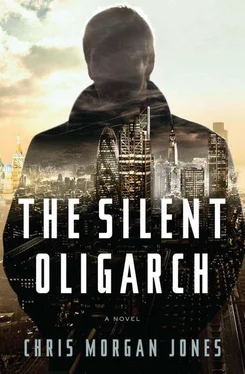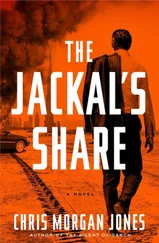Frau Werfel gave a small harrumph to let Webster know that she had been very helpful but was beginning to tire of all this irregularity. “I can’t say. Before you arrived I had been there for half an hour, I suppose, because some guests arrived at about half past four.”
“And did anyone else come in in that half hour?”
“No one, Herr Webster. Is that all?”
“That’s all. Thank you very much, Frau Werfel.” He longed to be able to do something. He did the one thing that was of any practical use and called Berlin’s central police station. He explained to them that his friend had gone missing and that he had just found what looked like a suicide note in his hotel room. The police asked him whether he had tried to call his friend. Yes, of course. Did he have any idea where his friend might have gone? No, none; he understood that there was little the police could do, but they could find photographs of Richard Lock on the Internet and perhaps circulate them to their patrol cars. The German policeman snorted and said yes, they could do that.
He hung up and looked out the window. The street below looked the same as before. He could tell from the snow on them that all the cars he could see were cold and hadn’t recently moved. There was no movement; only the snow falling thickly, round flakes dropping like rain, sometimes flurrying in a gust of wind. He drew the curtains and stood for a moment with his hands together, gripping the material, his eyes closed. This cannot be happening again.
He had to speak to Hammer but didn’t want to leave the room in case by some miracle Lock returned. He took a risk and used the hotel phone on the desk. Even Malin’s people weren’t agile enough to have tapped these lines by now. In any case, it didn’t really matter. Let them hear it.
“Ike, it’s Ben.”
“Well?”
“I’m at the hotel. This isn’t a secure line. There’s a bogus suicide note and an empty bottle of gin that wasn’t here when we left four or five hours ago.”
“So there’s a pattern.”
“There’s a pattern.”
“Do the police know?”
“They know he’s missing and depressed.”
“OK. I just left a voice-mail message for our fat Russian friend. Our favorite Etonian had a number for him. I didn’t want to involve the client yet. I don’t know which of his mobiles it is. I could try the client but I figured that he wouldn’t have any number we didn’t already have.”
Webster grunted in agreement. “What about Lock’s phone?”
“The signal’s dead.”
“Christ.” Webster pinched his eyes closed with his free hand. “The files?”
“They’re next.” Hammer paused. “I don’t know what else we can do.”
“There’s nothing else.”
“You OK?”
“No. I’m tired of making mistakes.”
“I’ve been thinking about that,” said Hammer. “When did Lock call Nina?”
“Yesterday morning. Marina the night before.”
“And by the afternoon there’s someone tailing him? That’s quick work.”
“I think they were PIs. Locals.”
“Locals don’t fake suicides. Not the ones I know anyway.”
“The Russians could have gotten here late yesterday.”
“That’s true.”
Webster thought for a moment. “Might be worth checking.”
“That’s not easy.”
“Have our travel-agent friend check for last-minute bookings.”
“What about private flights?”
“Yuri should be able to help.”
“OK.” Hammer paused. “What are you doing now?”
“I’m going to stay here and go quietly nuts. He may come back. If you need me call the Hotel Daniel and ask for Mr. Green in room 205.”
“OK. Don’t do anything stupid.”
“OK.”
There was nothing else to do.
He sat on the bed and picked up Lock’s copy of Middlemarch . The spine was broken about a hundred pages in and the book fell open naturally. Six hundred pages left. He wondered whether Lock would have the chance to finish it.
Where was he now? In a dark basement somewhere; in a van barreling out of Berlin; in the river, deep under the squares of ice that flowed on its surface like cold fat. How would they do it this time? Throw him under a train; off a bridge; from a window? He saw Lock, stupid and terrified, pulled along by two slablike faceless men, his eyes wide and red, knowing and not knowing what was next; Lock in a bright cell, his clothes filthy, a crowd around him, the only color in the scene the red line across his throat.
And for what? A vain quest for some distant, flickering justice that Webster knew he would never grasp.
He jerked his head back and beat it against the wall. Fresh pain stabbed at his wound. He did it again, his eyes looking up to the heavens, imploring them, filling with angry tears. And again, harder.
EVEN BEFORE he opened his eyes Lock was conscious of motion. He was lying down, he knew that, and shaking gently, unevenly, sharply jolting every now and then. A rumbling sound went through him. His knees were up and his feet pressed against something solid. He tried to move his hand to his head but his arm felt weighed down, as if no amount of effort would release it. He was hot and wanted air; he wanted to take air deep into his lungs but something was stopping him and each breath was short, tight, painful as he inhaled. Everywhere—in his head, in his stomach, rising into his throat—he felt nausea: surging, ebbing, always there.
Against his instincts, he opened his eyes a crack. It was dark, but orange light was pulsing across his vision. He opened them wider and with pain lifted his head an inch or two. He was in a tight space. One arm he couldn’t move at all, the other only a few inches. He could see his knees, and beyond them things were racing, lights were flashing past, white lights and yellow lights. They were spinning around him. He forced himself to watch for a while and slowly the space grew sharper. He made out a tree between the lights, and windows, and a wall. That was the world. Then where was he? He looked to his right. A man’s head, and the man was sitting down. He was in a car. He was being driven, at night, like a small child who has been told he can sleep in the backseat.
His body wanted him to be sick. He shut his eyes and resisted it, but he couldn’t control the urge. He rolled onto his side and felt all his muscles lock in a violent spasm. Then he collapsed onto his back once more.
“Fucker.” In Russian. The voice came from the front of the car. The head of the man in the seat turned around to look at him. More words in Russian followed. Lock couldn’t make them out. The smell of vomit reached him and made him gag, but he felt a little clearer, a little more like Richard Lock. In the stink he could smell gin. He raised himself up on his elbows and looked down at his body. He recognized his coat, his new shoes. This was him, all right. The same him.
Outside the window a city was flowing past. He tried to catch some of it, a shop name, a street sign, but the car was too fast and his eyes too slow; they slipped from point to point. It was definitely a city: the buildings were tall and the streets so wide that sometimes the buildings disappeared from sight. When they slowed he could hear other cars, tires rolling on wet tarmac, engines sawing through the gears.
The whole of his head hurt, from his forehead to the nape of his neck. He could sense the shape of his skull enclosing the pain. He tried to think through it. He remembered being in the taxi, with Webster, and walking ahead of him on the ice and seeing Webster fall. Then nothing, just emptiness. An impression of a bare bulb hanging from a cord, but nothing more.
He needed to know where he was. He forced himself to sit up a little farther, his head now resting against the car door, closed his eyes for a moment, and passed out.
Читать дальше












